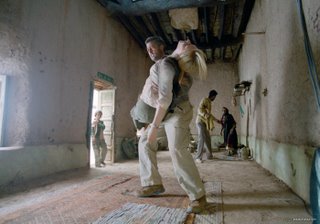 Plot: Yussef (Boubker Ait El Caid) and Ahmed (Said Tarchani) are practicing shooting with their father's new rifle, using cars on the highway below them as targets. One of Yussef's bullets hits an American woman, Susan (Cate Blanchett) on vacation with her husband, Richard (Brad Pitt). Their crisis prevents them from making it home in time to relieve their live-in nanny, Amelia (Adriana Barraza), so that she may attend her son's wedding. When she can find no one else to take Susan and Richard's kids (Elle Fanting and Nathan Gamble), Amelia decides to take them across the border with her and her nephew, Santiago (Gael García Bernal). Meanwhile, a deaf-mute girl, Chieko (Rinko Kikuchi), struggles with her relationship with her father (Kôji Yakusho) after her mother's suicide, in addition to all that adolescent fun.
Plot: Yussef (Boubker Ait El Caid) and Ahmed (Said Tarchani) are practicing shooting with their father's new rifle, using cars on the highway below them as targets. One of Yussef's bullets hits an American woman, Susan (Cate Blanchett) on vacation with her husband, Richard (Brad Pitt). Their crisis prevents them from making it home in time to relieve their live-in nanny, Amelia (Adriana Barraza), so that she may attend her son's wedding. When she can find no one else to take Susan and Richard's kids (Elle Fanting and Nathan Gamble), Amelia decides to take them across the border with her and her nephew, Santiago (Gael García Bernal). Meanwhile, a deaf-mute girl, Chieko (Rinko Kikuchi), struggles with her relationship with her father (Kôji Yakusho) after her mother's suicide, in addition to all that adolescent fun.Avoiding the press on this one has been difficult. I did, however, read this Crosstalk, in which Scott Tobias alleges that, in lesser hands than those of director Alejandro González Iñárritu, Babel would have been "Crash 2, an inelegant, deeply contrived narrative about the ripple effects of violence across the globe, or some such pretentious nonsense." For some reason, despite the fact that I am aware of how highly praised this movie, I got the distinct impression from this conversation that there was something wrong with the movie.
Unfortunately for the droves of people I have seen streaming from the movie's showings at ye olde Bytowne (or perhaps fortunately as no one else seems to have noticed), there is something wrong with this movie.
Guillermo Arriaga's screenplay tells four varied stories very well. Each individual story is expertly handled, but things start to fall apart when it comes to interlocking them. The two Morrocan stories and the Californian/Mexican story work well together, although they are not all chronologically linked up. Each story contains believable characters who, for the most part, make momentarily stupid decisions that end up going very poorly. Overall, it seems unlikely, but, in the moment, the acts seem plausible, even possible.
The Japanese story, though it is integrated about a hundred years in, is also well done, complete with fairly believable characters and performances. It's too bad that it really doesn't sync up with the rest of the themes. Sure, a few parallels could be drawn between, say, Yussef and Chieko. Even so, the story feels completely disjointed with the rest. It's too bad that they didn't make a movie just about Chieko, to be honest. I would have gone to see that.
Yes, the performances are all they are cracked up
 to be, with a particularly compelling turn from Pitt. Normally he seems like a fairly limited actor. Here, he pushes far beyond those bounds to get in touch with raw human emotion in a way he has never done in the past.
to be, with a particularly compelling turn from Pitt. Normally he seems like a fairly limited actor. Here, he pushes far beyond those bounds to get in touch with raw human emotion in a way he has never done in the past.As for González Iñárritu's much celebrated visual style, I'm going to have to plead partial ignorance on this one. I've never seen any of his work before this movie. To be honest, if this is the norm, I don't think I want to. Disorienting your viewers can have its place, but making them nearly fall over because you refuse to find a focus in a given situation isn't a style at all. In his defence, the kind of instances I speak of were rare.
So, what am I saying exactly? Perfomances: good, story: good, visual style: mostly good? Where's the beef? It's here: this movie is the kind that can't just be good. It has to be more than the sum of its parts. Or, alternatively, it doesn't all add up. Everything sepearately is good but, taking all together, isn't good. Each individual section needs to be excellent for this kind of movie to achieve the harmony necessary to make it palatable. Instead, it feels long and somewhat overblown, even dull in sections. There are individual scenes that veer in the direction of excellence but not enough of them. As such, the whole movie is bogged down.
At least we get another evocative guitar driven score from Gustavo Santaolalla. B-
No comments:
Post a Comment